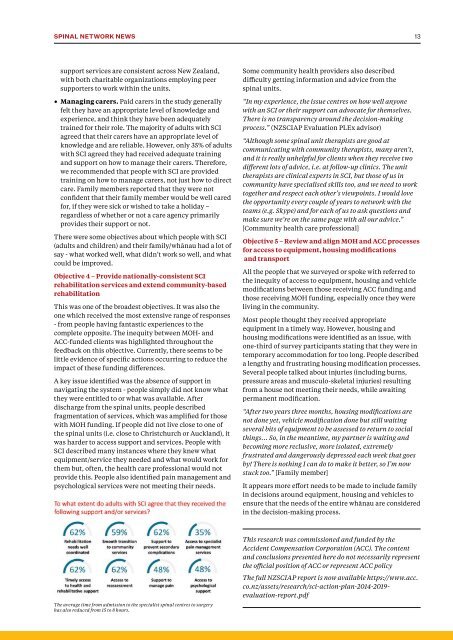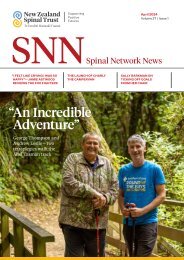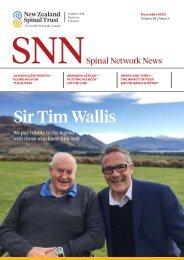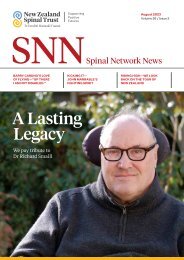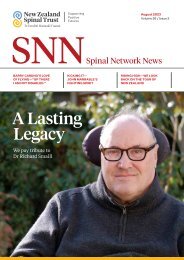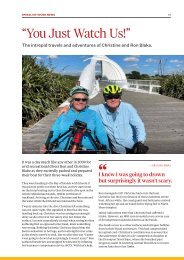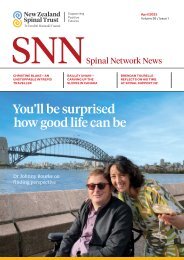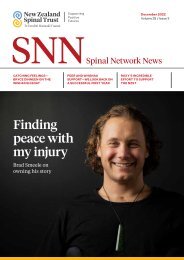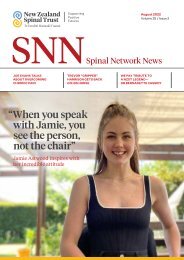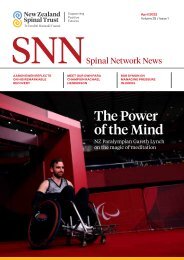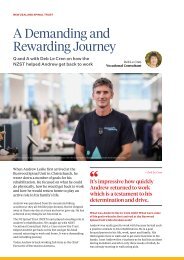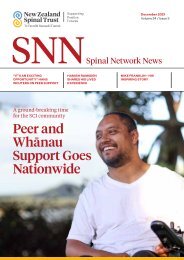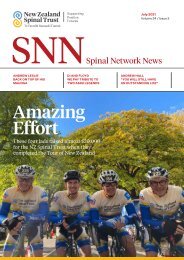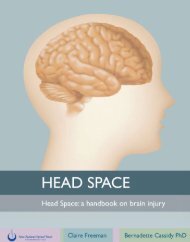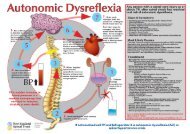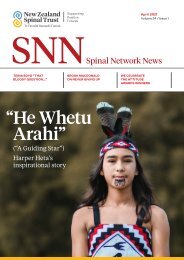SNN_August 2020 Issue FA_low res
You also want an ePaper? Increase the reach of your titles
YUMPU automatically turns print PDFs into web optimized ePapers that Google loves.
SPINAL NETWORK NEWS 13<br />
support services are consistent across New Zealand,<br />
with both charitable organizations employing peer<br />
supporters to work within the units.<br />
• Managing carers. Paid carers in the study generally<br />
felt they have an appropriate level of knowledge and<br />
experience, and think they have been adequately<br />
trained for their role. The majority of adults with SCI<br />
agreed that their carers have an appropriate level of<br />
knowledge and are reliable. However, only 35% of adults<br />
with SCI agreed they had received adequate training<br />
and support on how to manage their carers. Therefore,<br />
we recommended that people with SCI are provided<br />
training on how to manage carers, not just how to direct<br />
care. Family members reported that they were not<br />
confident that their family member would be well cared<br />
for, if they were sick or wished to take a holiday –<br />
regardless of whether or not a care agency primarily<br />
provides their support or not.<br />
There were some objectives about which people with SCI<br />
(adults and children) and their family/whānau had a lot of<br />
say - what worked well, what didn’t work so well, and what<br />
could be improved.<br />
Objective 4 – Provide nationally-consistent SCI<br />
rehabilitation services and extend community-based<br />
rehabilitation<br />
This was one of the broadest objectives. It was also the<br />
one which received the most extensive range of <strong>res</strong>ponses<br />
- from people having fantastic experiences to the<br />
complete opposite. The inequity between MOH- and<br />
ACC-funded clients was highlighted throughout the<br />
feedback on this objective. Currently, there seems to be<br />
little evidence of specific actions occurring to reduce the<br />
impact of these funding differences.<br />
A key issue identified was the absence of support in<br />
navigating the system - people simply did not know what<br />
they were entitled to or what was available. After<br />
discharge from the spinal units, people described<br />
fragmentation of services, which was amplified for those<br />
with MOH funding. If people did not live close to one of<br />
the spinal units (i.e. close to Christchurch or Auckland), it<br />
was harder to access support and services. People with<br />
SCI described many instances where they knew what<br />
equipment/service they needed and what would work for<br />
them but, often, the health care professional would not<br />
provide this. People also identified pain management and<br />
psychological services were not meeting their needs.<br />
Some community health providers also described<br />
difficulty getting information and advice from the<br />
spinal units.<br />
“In my experience, the issue cent<strong>res</strong> on how well anyone<br />
with an SCI or their support can advocate for themselves.<br />
There is no transparency around the decision-making<br />
process.” (NZSCIAP Evaluation PLEx advisor)<br />
“Although some spinal unit therapists are good at<br />
communicating with community therapists, many aren’t,<br />
and it is really unhelpful for clients when they receive two<br />
different lots of advice, i.e. at fol<strong>low</strong>-up clinics. The unit<br />
therapists are clinical experts in SCI, but those of us in<br />
community have specialised skills too, and we need to work<br />
together and <strong>res</strong>pect each other’s viewpoints. I would love<br />
the opportunity every couple of years to network with the<br />
teams (e.g. Skype) and for each of us to ask questions and<br />
make sure we’re on the same page with all our advice.”<br />
[Community health care professional]<br />
Objective 5 – Review and align MOH and ACC processes<br />
for access to equipment, housing modifications<br />
and transport<br />
All the people that we surveyed or spoke with referred to<br />
the inequity of access to equipment, housing and vehicle<br />
modifications between those receiving ACC funding and<br />
those receiving MOH funding, especially once they were<br />
living in the community.<br />
Most people thought they received appropriate<br />
equipment in a timely way. However, housing and<br />
housing modifications were identified as an issue, with<br />
one-third of survey participants stating that they were in<br />
temporary accommodation for too long. People described<br />
a lengthy and frustrating housing modification processes.<br />
Several people talked about injuries (including burns,<br />
p<strong>res</strong>sure areas and musculo-skeletal injuries) <strong>res</strong>ulting<br />
from a house not meeting their needs, while awaiting<br />
permanent modification.<br />
“After two years three months, housing modifications are<br />
not done yet, vehicle modification done but still waiting<br />
several bits of equipment to be assessed to return to social<br />
things… So, in the meantime, my partner is waiting and<br />
becoming more reclusive, more isolated, extremely<br />
frustrated and dangerously dep<strong>res</strong>sed each week that goes<br />
by! There is nothing I can do to make it better, so I’m now<br />
stuck too.” [Family member]<br />
It appears more effort needs to be made to include family<br />
in decisions around equipment, housing and vehicles to<br />
ensure that the needs of the entire whānau are considered<br />
in the decision-making process.<br />
This <strong>res</strong>earch was commissioned and funded by the<br />
Accident Compensation Corporation (ACC). The content<br />
and conclusions p<strong>res</strong>ented here do not necessarily rep<strong>res</strong>ent<br />
the official position of ACC or rep<strong>res</strong>ent ACC policy<br />
The average time from admission to the specialist spinal cent<strong>res</strong> to surgery<br />
has also reduced from 15 to 8 hours.<br />
The full NZSCIAP report is now available https://www.acc.<br />
co.nz/assets/<strong>res</strong>earch/sci-action-plan-2014-2019-<br />
evaluation-report.pdf


